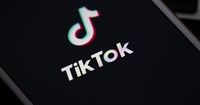In a significant blow to the popular social media platform TikTok, the Irish Data Protection Commission (DPC) has imposed a hefty fine of 530 million euros, marking one of the largest penalties in European history regarding data privacy. This decision follows extensive investigations that revealed TikTok's illegal transfer of personal data belonging to European users to servers in China, a clear violation of the General Data Protection Regulation (GDPR).
The DPC's ruling is particularly noteworthy as it represents the third-largest fine ever levied under the GDPR since its implementation in 2018. The investigation uncovered that TikTok had sent sensitive user data to China without appropriate safeguards, leaving this information vulnerable to potential government access. Graham Doyle, the Deputy Commissioner of the DPC, emphasized the seriousness of the findings, stating, "We take this matter very seriously," as the commission discovered "limited data for European users" on Chinese servers.
The fine itself is divided into two parts: 485 million euros for the unlawful transfer of data to China and an additional 45 million euros for the company's lack of transparency in informing users about these practices. Between 2020 and 2022, TikTok failed to adequately notify its users that their data could be transferred outside Europe to a legal environment that significantly differs from European data protection standards.
Moreover, the DPC pointed out that TikTok did not update its privacy policy until late 2022, a move that only began to bring the company into relative compliance with European rules. The commission has now given TikTok a strict deadline of six months to amend its data handling practices or face a permanent suspension of data transfers to China, a consequence that could have drastic implications for the app's operations in Europe.
In response to the ruling, TikTok has expressed its intention to appeal the decision, with Christine Gran, the company's head of public policy in Europe, stating, "We are disappointed that the data authority did not take seriously the assurances we implemented, at a time when we are using the same legal mechanisms that thousands of other companies rely on." Gran further highlighted TikTok's commitment to data security, referencing the company's investment of 12 billion euros in its "Clover" project, aimed at establishing data centers within the European Union to ensure local data storage.
Despite these assurances, TikTok has faced mounting scrutiny regarding its ties to the Chinese government. The platform has repeatedly denied any allegations of sharing user data with Beijing, asserting that it has not provided personal information to the Chinese authorities. However, the European decision comes amid growing international tensions surrounding the relationship between Chinese tech companies and their government, particularly concerning personal data security.
As concerns over data privacy escalate, various countries, including the United States, Canada, and Japan, are ramping up their investigations into TikTok's practices. Some governmental institutions are even considering banning the app altogether due to these security issues. This heightened scrutiny reflects a broader wave of skepticism towards technology companies linked to China, as Western nations seek to protect their citizens' data from potential exploitation.
The implications of this ruling extend beyond TikTok's immediate operations, as it signals a crucial moment in the ongoing global discourse about data privacy and the responsibilities of tech companies. As the digital landscape continues to evolve, the need for stringent data protection measures becomes increasingly evident, prompting regulatory bodies to take decisive action against violations.
In light of the DPC's ruling, TikTok faces a challenging road ahead as it navigates the complexities of European data protection laws while trying to maintain its user base and business operations. The outcome of this case may not only influence TikTok's future but could also set a precedent for how other tech companies handle user data in an increasingly regulated environment.
As the situation develops, it remains to be seen how TikTok will adapt to the DPC's demands and what further regulatory actions may arise in response to its data handling practices. The pressure is mounting, and the stakes are high, not just for TikTok but for the broader tech industry navigating the intricate landscape of global data privacy.



